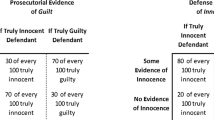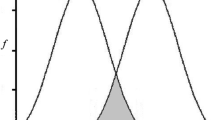Abstract
Previous economic analyses of plea bargaining have largely ignored its impact on the deterrence of crime. Instead, they have focused on the bargaining between a defendant and a prosecutor once a crime has been committed. This article remedies this deficiency by asking how the practice of plea bargaining influences the determination of criminal punishment and thereby the supply of crime by rational offenders. The key question examined is, how do the ex post objectives of prosecutors affect the ability of legislatures to implement criminal punishments aimed at achieving optimal deterrence? Various prosecutorial objectives are considered in answering this question.
Similar content being viewed by others
References
Adelstein, R. (1978a). “The Plea Bargain in Theory: A Behavioral Model of the Negotiated Guilty Plea.”Southern Economics Journal 44, 488–503.
Adelstein, R. (1978b). “The Negotiated Guilty Plea: A Framework for Analysis.”New York University Law Review 53, 783–833.
Adelstein, R. (1979). “Informational Paradox and the Pricing of Crime: Capital Sentencing Standards in Economic Perspective.”Journal of Criminal Law and Criminology 70, 281–298.
Adelstein, R. (1981). “Institutional Function and Evolution in the Criminal Process.”Northwestern University Law Review 76, 2–99.
Andreoni, J. (1991). “Reasonable Doubt and the Optimal Magnitude of Fines: Should the Penalty Fit the Crime?”Rand Journal of Economics 22, 385–395.
Becker, G. (1968). “Crime and Punishment: An Economic Approach.”Journal of Political Economics 76, 169–217.
Dawson, R. (1969).Sentencing: The Decision as to Type, Length, and Conditions of Sentence. Boston: Little, Brown.
Forst, B., and K. Brossi. (1977). “A Theoretical and Empirical Analysis of the Prosecutor.”Journal of Legal Studies 6, 177–191.
Freed, D. (1992). “Federal Sentencing in the Wake of Guidelines: Unacceptable Limits on the Discretion of Sentencers.”Yale Law Journal 101, 1681–1754.
Grossman, B. (1969).The Prosecutor. Toronto: University of Toronto Press.
Grossman, G., and M. Katz. (1983). “Plea Bargaining and Social Welfare.”American Economics Review 73, 749–757.
Harris, J. (1970). “On the Economic of Law and Order.”Journal of Political Economics 78, 165–174.
Hart, H. L. A. (1968).Punishment and Responsibility. Oxford: Clarendon Press.
Kobayashi, B. (1992). “Deterrence with Multiple Defendants: An Explanation of ‘Unfair’ Plea Bargains.”Rand Journal of Economics 23, 507–517.
Kobayashi, B., and J. Lott. (1992). “Low-Probability-High-Penalty Enforcement Schemes and the Efficient Operation of the Plea Bargaining System.”International Review of Law and Economics 12, 69–77.
Landes, W. (1971). “An Economic Analysis of the Courts.”Journal of Law and Economics 14, 61–107.
Langbein, J. (1979). “Land Without Plea Bargaining: How the Germans Do It.”Michigan Law Review 78, 204–225.
Malik, A. S. (1990). “Avoidance, Screening and Optimum Enforcement.”Rand Journal of Economics 21, 341–353.
Mermin, S. (1982).Law and the Legal System. Boston: Little, Brown.
Miceli, T. (1990). “Optimal Prosecution of Defendants Whose Guilt Is Uncertain.”Journal of Law, Economics and Organization 6, 189–201.
Miceli, T. (1991). “Optimal Criminal Procedure: Fairness and Deterrence.”International Review of Law and Economics 11, 3–10.
Miceli, T. (1994). “Prison and Parole: Minimizing the Cost of Non-Monetary Sanctions as Deterrents.”Research in Law and Economics 16, 197–211.
Polinsky, A. M., and D. Rubinfeld. (1988). “The Deterrent Effects of Settlements and Trials.”International Review of Law and Economics 8, 109–116.
Polinsky, A. M., and S. Shavell. (1979). “The Optimal Trade-off Between the Probability and Magnitude of Fines.”American Economic Review 69, 880–891.
Polinsky, A. M., and S. Shavell. (1984). “The Optimal Use of Fines and Imprisonment.”Journal of Public Economics 24, 89–99.
Polinsky, A. M., and S. Shavell. (1991). “A Note on Optimal Fines When Wealth Varies Among Individuals.”American Economics Review 81, 618–621.
Reinganum, J. (1988). “Plea Bargaining and Prosecutorial Discretion.”American Economics Review 78, 713–728.
Reinganum, J. (1993). “The Law Enforcement Process and Criminal Choice.”International Review of Law and Economics. 13, 115–134.
Rubinfeld, D., and D. Sappington. (1987). “Efficient Awards and Standards of Proof in Judicial Proceedings.”Rand Journal of Economics 18, 308–315.
Schulhofer, S. (1988). “Criminal Justice Discretion as a Regulatory System.”Journal of Legal Studies 17, 43–82.
Snyder, E. (1990). “The Effect of Higher Criminal Penalties on Antitrust Enforcement.”Journal of Law and Economic. 33, 439–462.
Statistical Abstract of the United States. (1994). Washington, DC: U.S. Government Printing Office.
Waldfogel, J. (1993). “Criminal Sentences as Endogenous Taxes: Are They ‘Just’ or ‘Efficient’?”Journal of Law and Economics 36, 139–151.
Wittman, D. (1974). “Two Views of Procedure.”Journal of Legal Studies 3, 249–256.
Author information
Authors and Affiliations
Rights and permissions
About this article
Cite this article
Miceli, T.J. Plea bargaining and deterrence: An institutional approach. Eur J Law Econ 3, 249–264 (1996). https://doi.org/10.1007/BF00709142
Issue Date:
DOI: https://doi.org/10.1007/BF00709142




